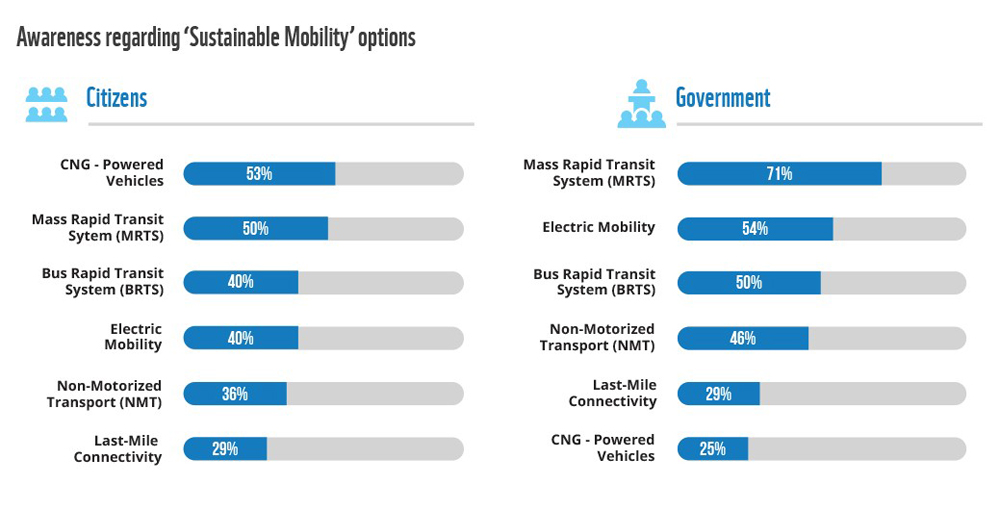Bengaluru- one of the fastest growing cities in the country, also known as India’s Silicon Valley, emerged as the worst traffic-congested city globally as per a 2019 survey by the Dutch real-time traffic information and services company, TomTom. But what makes the ‘Garden City of India’ traffic-tangled?
Karnataka Transport Department states that there was one vehicle for every two persons on the streets of Bengaluru, as per the Census 2011. The city now has even higher vehicle ownership ratio. This has led to worsening of the traffic situation, as the existing road infrastructure is unable to support the increasing number of vehicles in the city, leading to associated adverse impacts of higher fossil fuel emissions, air pollution, which is consequently affecting general well-being and health of the citizens. It is therefore imperative for a city like Bengaluru to make a immediate transition to sustainable and low carbon mobility options, such as public transport facilities for which there needs to be improvement in infrastructure facilities, adopting electric mobility, and promoting non-motorised transport such as walking and cycling.
WWF India recently conducted a survey in the city to understand the perception of citizens, government officials, and civil society about different aspects of sustainable mobility. Besides understanding the perception on challenges and opportunities for sustainable mobility, the aim was also to gauge the level of general awareness regarding the adoption of sustainable mobility as a means of addressing climate change, and thereby receiving the dual-benefit of improved air quality ultimately leading to better overall health. With these goals in mind, various stakeholders in the city including citizens, government officials (from transport-related departments), and civil society organizations were surveyed through online and face-to-face interviews. The respondents were asked a common set of questions regarding:
Following is a summary of the key findings of the perception survey:
PERCEPTION ABOUT TRANSPORT-RELATED ISSUES IN BENGALURU
The travel behaviour and various other parameters revealed that commuters using cars and 2-wheelers spend 24 minutes every day in traffic congestion, yet most respondents preferred to use private transport (cars & 2-wheelers) for their daily commute. Only 34% of the surveyed citizens admitted to using public transport on a daily basis.

For all stakeholders (citizens, government officials, civil society), air pollution-related health problems, traffic congestion & high levels of emissions were perceived as the biggest issues related to transport, whereas the opinions on the need for improvement in affordability, safety, and accessibility of transport were somewhat neutral.
PERCEPTION ABOUT PUBLIC TRANSPORT IN BENGALURU
A question on the level of satisfaction with existing public transport facilities revealed that citizens were more satisfied with Namma Metro as compared to the existing bus network, this can be attributed to a higher duration of traffic congestions faced by those travelling longer distances. Citizens were more concerned about factors like parking facilities at stations, seat availability, cleanliness, travel time, punctuality, environment friendliness, and last-mile connectivity in the existing modes of public transportation. While citizens indicated cleanliness, availability of seats, affordability, and reduced travel time as motivations for making a shift to public transport, the civil society responses emphasized the need for real-time information, last-mile connectivity & punctuality as motivating factors for enhanced uptake of public transport among citizens. Surveyed government officials believed that better policies addressing environmental concerns, and those that focused towards strengthening operations & traffic management would encourage people towards using public transportation.

PERCEPTION ABOUT SUSTAINABLE MOBILITY
A detailed assessment regarding the basic understanding of sustainable mobility shows that while citizens were aware of sustainable mobility options in Bengaluru, when it came to actual usage, they still preferred private transportation. Most respondents (including citizens and government officials) recognized CNG-powered vehicles, Mass Rapid Transit System (MRTS), Bus Rapid Transit System (BRTS) as sustainable mobility options. The majority of government officials were well aware of the city- level policies and plans promoting sustainable mobility. Namma Metro, Green Links Project for promotion of Non-Motorized Transport, dedicated bus priority lane, integrating metro with last-mile connectivity, and better parking policies like park & ride were mentioned as the major sustainable mobility initiatives undertaken in Bengaluru. Besides these, Government officials also highlighted measures such as preparation of pedestrian & road safety guidelines, creation of State Urban Transport Fund, and the proposed Action Plan for Control of Air Pollution as enablers of sustainable mobility in Bengaluru.

PERCEPTION ABOUT SUSTAINABLE MOBILITY, CLIMATE CHANGE AND AIR POLLUTION
Majority of the citizens and government officials agreed that climate change is real, and 82% agreed that vehicular emissions are widely responsible for global warming. While most respondents opined that the transport sector contributed to air pollution in the city, the perception of the percentage contribution varied. However, the awareness among survey citizens regarding measures to control air pollution in the city was found to be limited.

To plan citizen-friendly sustainable transportation infrastructure in Bengaluru, it is crucial to understand citizens’ perspective on existing low carbon mobility options in the city, and their personal choices in terms of transitioning to climate-friendly mobility behaviour. Most of the citizens said that Namma Metro, public transport, and electric Vehicles are key examples of the incorporation of climate change perspective in Bengaluru’s transportation-related planning. Although, currently most of the surveyed citizens preferred to use private transport for daily commute, about 41% expressed an intent to transition to public transport as a sustainable lifestyle choice to reduce their individual carbon footprint. Others preferred low-carbon mobility options such as NMT (walking and cycling), electric vehicles, and carpooling.
In summary, a comprehensive analysis of the survey findings revealed the priority interventions recommended for catalysing a smooth transition towards sustainable low-carbon mobility in Bengaluru, these include:
Operationalising a Unified Metropolitan Transport Authority (UMTA)

WWF-India has been engaging with stakeholders in Bengaluru on aspects related to sustainable mobility since 2016, as part of WWF’s global platform for cities – One Planet City Challenge. This survey was conducted in December 2019 in continuation of this engagement.
Read the full report here: https://d2391rlyg4hwoh.cloudfront.net/downloads/perception_study_on_sustainable_mobility_in_bengaluru.pdf